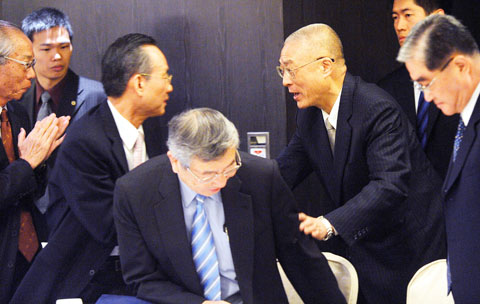Premier Wu Den-yih (吳敦義) yesterday denied speculation that Taiwan would allow Chinese banks to merge with or invest in Taiwanese banks or financial institutions.
Asked to comment on reports that Chinese banks would now be allowed to merge with Taiwan-based banks and financial institutions, Wu told the Taiwan Foreign Correspondents Club that this was not the case.
“So far, it is not the case that Chinese banks can buy Taiwanese banks,” Wu said.

PHOTO: CHIEN JUNG-FONG, TAIPEI TIMES
He said, however, that during talks on a proposed economic cooperation framework agreement (ECFA) between Taiwan and China, discussions could touch on allowing one or two Chinese banks to open branches in Taiwan.
“We might discuss one or two Chinese branches being able to establish themselves in Taiwan,” the premier said, “but there will be no discussions on acquiring Taiwanese banks.”
Wu, who emphasized that the administration would take a “step-by-step” approach to cross-strait agreements, said that an ECFA would not be discussed during the fourth round of talks between the Straits Exchange Foundation and China’s Association for Relations Across the Taiwan Strait in Taichung later this month.
Negotiations on an ECFA, he said, would start at the beginning of next year.
Minister of Economic Affairs Shih Yen-shiang (施顏祥) said later yesterday that the two sides would begin formal negotiations on an ECFA after the Lunar New Year, which falls in mid-February.
Earlier yesterday, Wu told representatives of the Chinese National Association of Industry and Commerce (CNAIC, 工商協進會) that Taiwan’s industrial development would be jeopardized without an ECFA in view of the threats posed by ASEAN Plus One.
With the ASEAN Plus One to take effect next year, the average export tariffs on Taiwanese goods to China will be 9 percent more than those of ASEAN countries — a disadvantage that could put companies off setting up production facilities in Taiwan, he said.
Taiwan will be further marginalized when a free-trade zone is formed among ASEAN with China, South Korea and Japan, he said.
CNAIC chairman Theodore Huang (黃茂雄) said that the government should allay companies’ skepticism on the potential impact of an ECFA and come up with plans to help affected industries.

In Italy’s storied gold-making hubs, jewelers are reworking their designs to trim gold content as they race to blunt the effect of record prices and appeal to shoppers watching their budgets. Gold prices hit a record high on Thursday, surging near US$5,600 an ounce, more than double a year ago as geopolitical concerns and jitters over trade pushed investors toward the safe-haven asset. The rally is putting undue pressure on small artisans as they face mounting demands from customers, including international brands, to produce cheaper items, from signature pieces to wedding rings, according to interviews with four independent jewelers in Italy’s main

Japanese Prime Minister Sanae Takaichi has talked up the benefits of a weaker yen in a campaign speech, adopting a tone at odds with her finance ministry, which has refused to rule out any options to counter excessive foreign exchange volatility. Takaichi later softened her stance, saying she did not have a preference for the yen’s direction. “People say the weak yen is bad right now, but for export industries, it’s a major opportunity,” Takaichi said on Saturday at a rally for Liberal Democratic Party candidate Daishiro Yamagiwa in Kanagawa Prefecture ahead of a snap election on Sunday. “Whether it’s selling food or

CONCERNS: Tech companies investing in AI businesses that purchase their products have raised questions among investors that they are artificially propping up demand Nvidia Corp chief executive officer Jensen Huang (黃仁勳) on Saturday said that the company would be participating in OpenAI’s latest funding round, describing it as potentially “the largest investment we’ve ever made.” “We will invest a great deal of money,” Huang told reporters while visiting Taipei. “I believe in OpenAI. The work that they do is incredible. They’re one of the most consequential companies of our time.” Huang did not say exactly how much Nvidia might contribute, but described the investment as “huge.” “Let Sam announce how much he’s going to raise — it’s for him to decide,” Huang said, referring to OpenAI

The global server market is expected to grow 12.8 percent annually this year, with artificial intelligence (AI) servers projected to account for 16.5 percent, driven by continued investment in AI infrastructure by major cloud service providers (CSPs), market researcher TrendForce Corp (集邦科技) said yesterday. Global AI server shipments this year are expected to increase 28 percent year-on-year to more than 2.7 million units, driven by sustained demand from CSPs and government sovereign cloud projects, TrendForce analyst Frank Kung (龔明德) told the Taipei Times. Demand for GPU-based AI servers, including Nvidia Corp’s GB and Vera Rubin rack systems, is expected to remain high,